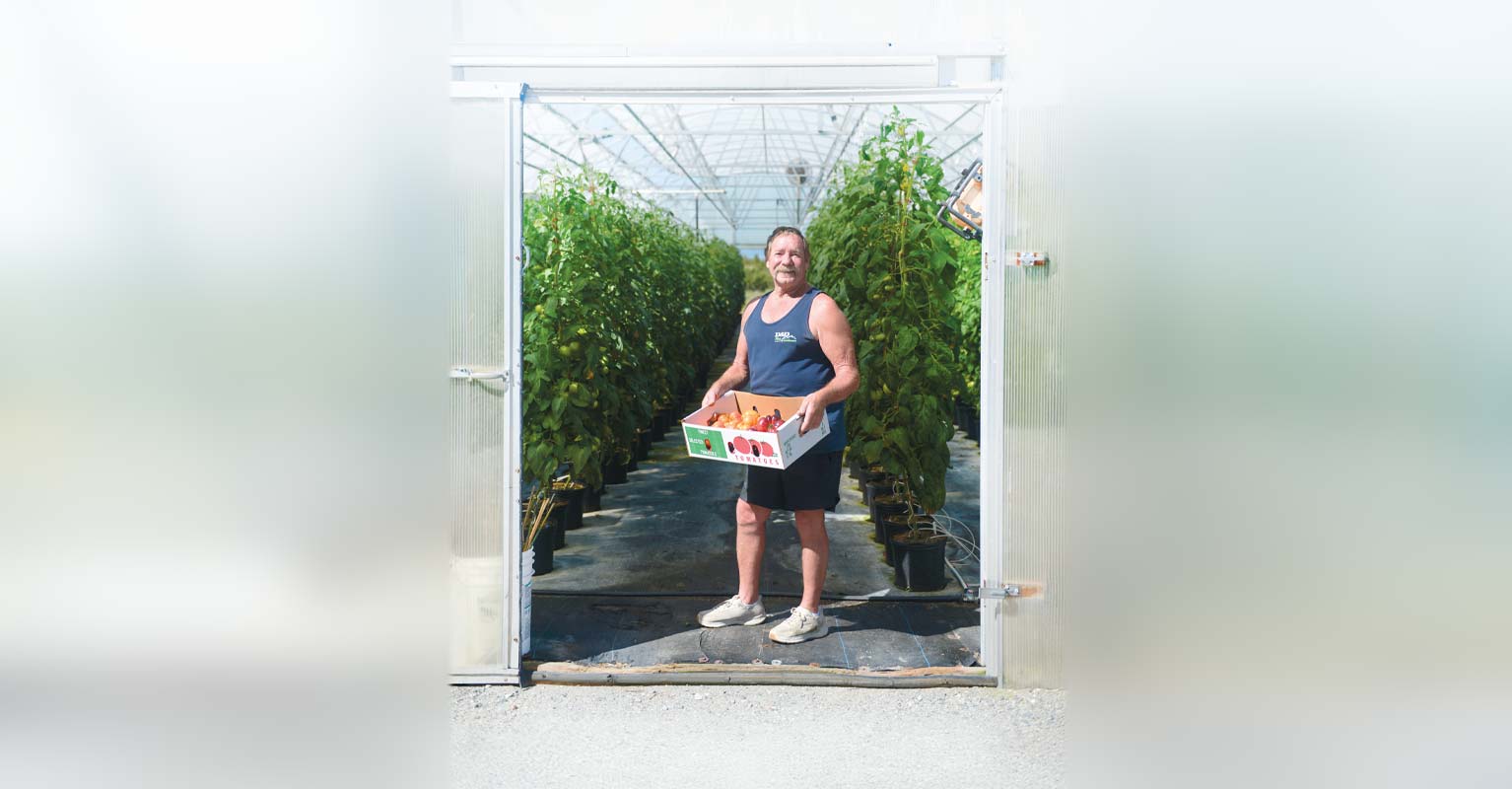Campione Roman Kitchen
In the age of social media, it would be easy to regard the name of Livingston’s newest Italian restaurant, Campione Roman Kitchen, as a boast or self-promotion. After all, “campione” in Italian means “champion,” which on the surface seems like a bold statement from three partners, Josh Adams, Anthony Sferra, and Jeffrey Galli, who just opened their first business in August 2020, during an ongoing pandemic.
“We came up with the idea of ‘champion’ not in a sense of winning,” Galli says. “Instead, we mean the restaurant is a champion for Livingston, that is, for the community first; really focused on service and inspired by local agriculture.”
To that end, the three partners in Campione laid a mosaic of floor tiles, placed inside the restaurant doorstep, that reads, “In the Service of Others.” The tiles feature a laurel leaf, the Roman symbol of victory. “It is a reminder to celebrate generosity of spirit, inclusivity, and community,” says Galli. With close to sixty years of combined food and drink industry experience, the Roman Kitchen trio is well equipped to serve.
LITTLE ITALY
Though Italy as a country is just over 150 years old, culture is rich on the Apennine Peninsula, enduring the trials of time thanks to the social fabric of each village. Italian emigrants hung on to this sense of community when they entered America, creating “Little Italys” as odes to the towns they used to call home. The restaurants that sprang up in these areas often focused on cuisine that would nourish the souls of the small communities.
Campione isn’t a traditional Italian restaurant—Galli says their dishes aren’t made in the typical Italian fashion but are instead Italian-inspired renditions that show off Montana ingredients— but the eatery dishes up cuisine distinctly recognizable as that served in Sicily, Venice, or Rome.
Prior to opening Campione, Adams, Sferra, and Galli became fast friends after working together in the service industry in Livingston. They found a shared love of their adopted hometown, each coming to Park County from a separate corner of the world: Galli, who handles the front of house, events, and communications, grew up in New York; Sferra, who oversees the baking and music, spent his childhood in Australia; and Adams, the head chef, was raised in Taiwan. Vested in community, they forged ahead to embrace a mutual dream of opening their own restaurant.
It was important to the budding entrepreneurs to embrace the town’s past as a means for connecting with its future. This was realized through their location at 101 N. Main St., where the three Thompson brothers built the Thompson Company general store in 1904, which sold groceries, clothing, and dry goods.
In its role as a general store, it’s not hard to imagine the old Thompson Company location as the former social hub of Livingston, with people coming in to get the local news just as much as they did to get their groceries. It’s the hope of the new inhabitants that the space remains a social place.
To capture the community feel, the partners opted for an open-kitchen design that invites interaction between staff and patrons. “[Well-known architect] Frank Lloyd Wright said, ‘The fireplace is the heart of the home itself,’ and we feel like there’s a lot of that energy and warmth coming from our kitchen,” Galli says. Other inviting touches include the vintage record player sounding out Italian pop and retro soul from vinyl procured at Bitterroot Records, and vibrant plants from Livingston’s Rooted in Montana.
During renovations, the trio chose to expose the old brick walls and contrast it with a pressed tin ceiling and mosaic floor tiles. The result, as Sferra puts it, “maintains the integrity of the space but makes it fresh—like a Bob Dylan song.”
Call it farm-to-table, Italian-inspired, Montana-centric, local-focused, or even Montalian—since the food they make is for the community, the partners behind Campione don’t care how others define their food.
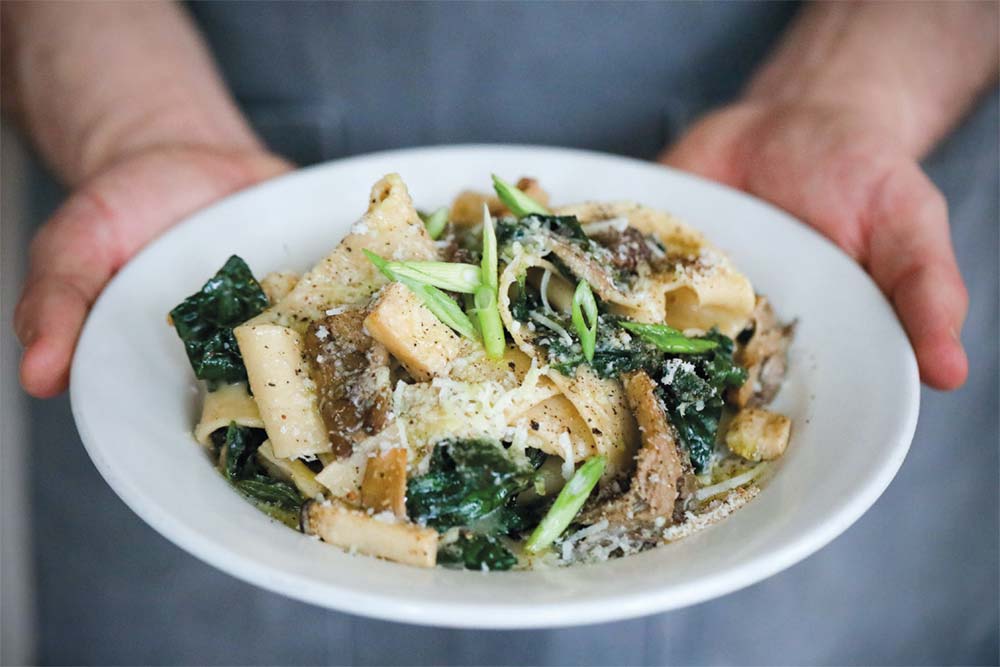
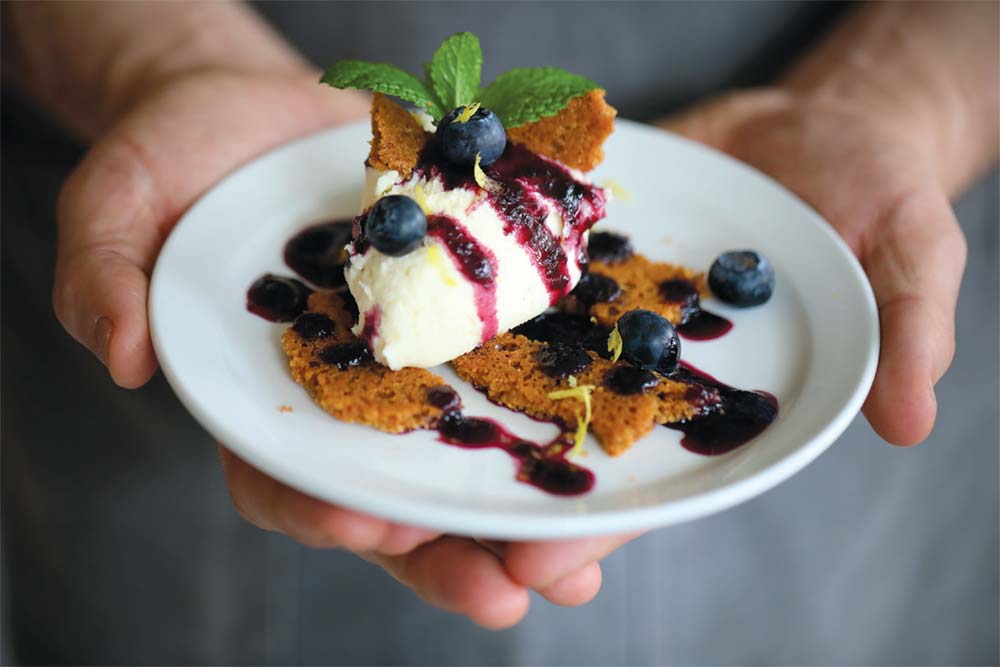
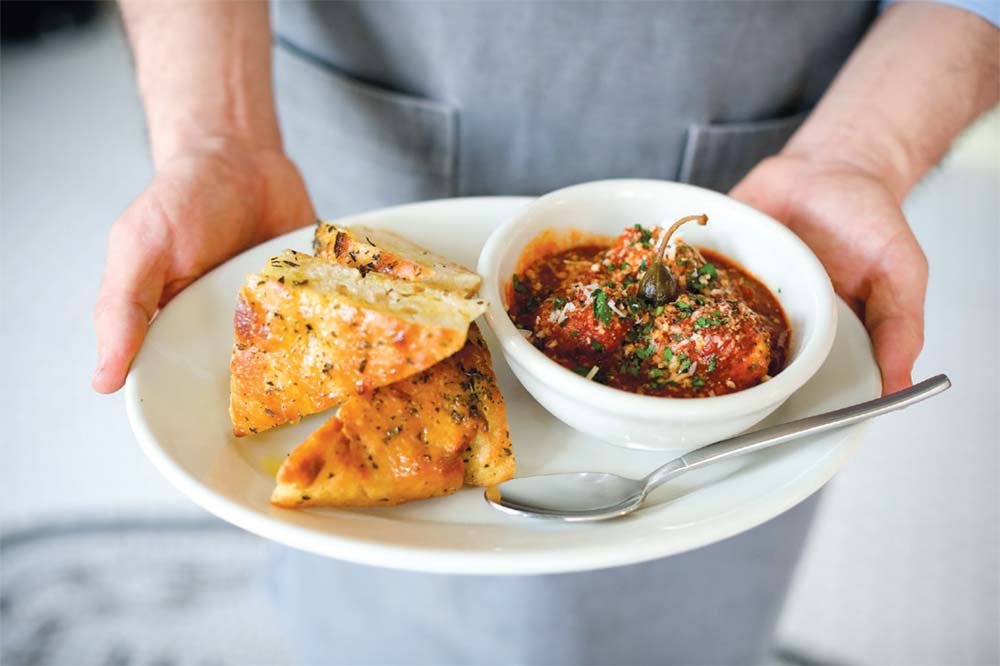
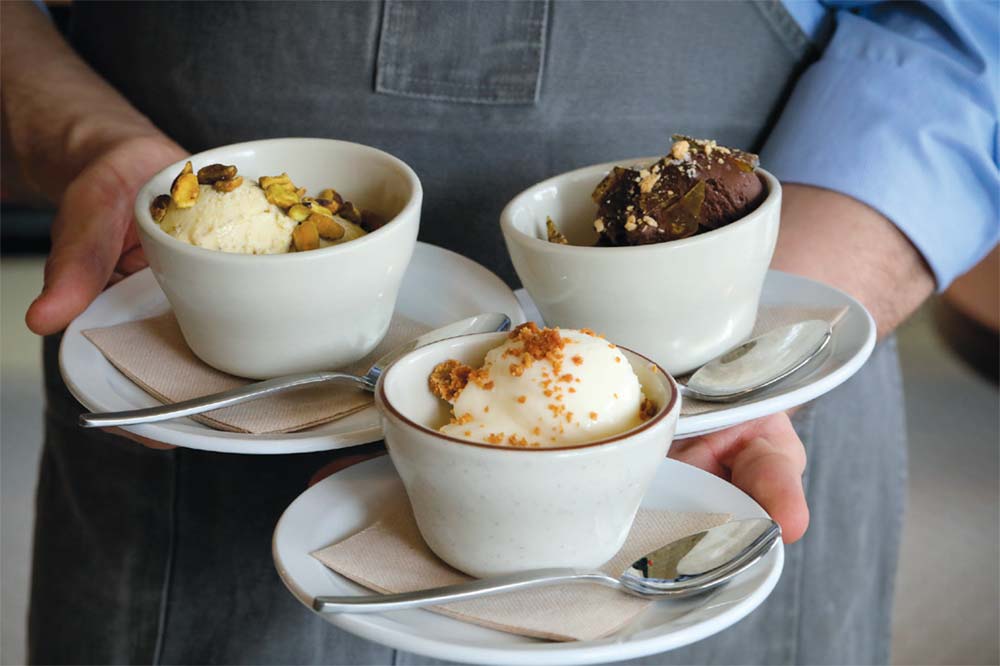
WORKING TOGETHER
At the height of operation for the Thompson general store, the only fresh food available to Montanans would have been locally produced and seasonally grown produce and meats. Already honoring the old building’s tradition, it makes sense that Campione puts a premium on procuring their ingredients from the Southwest Montana community.
“Our ethos is working with friends and neighbors whenever we can,” Adams says. “Especially during this time when small businesses are struggling, it is important that we support them however we can.” This approach makes for a menu that will change often depending on what’s ripe, what’s available, and what happens to inspire.
One item that seems destined to be a fixture at Campione is the meatballs. Sferra says they got right to work developing their in-house meatballs, and after months of work on the recipe, they finally arrived at the perfect product. “We’re very proud of them,” Galli adds. “We’ve been eating them every day and I still look forward to it.”
The meatballs are made with Montana beef and pork, which is probably why they go so well with the fresh linguine, made right up the street at the Livingston Food Resource Center by Susanne Klaric from Dolina Pasta. She uses wheat grown and milled in Montana as well as local eggs. “I’d love to make our own pasta,” Adams says. “But it’s great to support another small business that’s making a phenomenal product.”
A traditional Italian dessert, affogato immediately made the menu list and is also a product of the Campione philosophy of partnership. Affogato is a creamy smooth Italian ice cream made with premium milk and cream, drowned in a shot of espresso. And for the Campione rendition, Kalispell Kreamery dairy melds with a specialty coffee roast prepared by Yellowstone Coffee Roasters.
The trio spent a month tasting different brews until they got the blend just right. “It’s a light, northeastern Italian– style roast that matches very well with the toasted sugar base of our fi or di latte gelato,” Galli says. “It’s so simple—there’s only two ingredients—but because there’s care and thought put into it, it creates something bigger than the sum of the two parts.”
Call it farm-to-table, Italian-inspired, Montana-centric, local-focused, or even Montalian—since the food they make is for the community, the partners behind Campione don’t care how others define their food.
“The reality is that we’re not a cuisine that’s tied down by technique or ingredients, but completely defined by the care, love, and nostalgia that goes into it,” Sferra says. “Once you get past the hurdle that you don’t have to do things one exact way, you realize you just have to really, really care.” That kind of approach is sure to win a lot of hearts.


